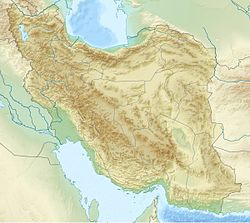Eram Garden (Persian: باغ ارم, Bāgh-e Eram) is a historic Persian garden in Shiraz, Iran. The garden, and the building within it, are located at the northern shore of the Khoshk River in the Fars province.
| UNESCO World Heritage Site | |
|---|---|
 | |
| Location | Shiraz, Fars Province, Iran |
| Part of | The Persian Garden |
| Reference | 1372-002 |
| Inscription | 2011 (35th Session) |
| Area | 12.7 ha (1,370,000 sq ft) |
| Buffer zone | 70.5 ha (7,590,000 sq ft) |
| Coordinates | 29°38′09″N 52°31′31″E / 29.63583°N 52.52528°E |
History
editThe origins of the garden may go back to the 12th century, during the Seljuk period, when a garden later called Bagh-e Shah probably existed on this site up to the 18th century.[1][2] This may have influenced the overall layout to the present day.[1]
The current gardens were planted in the 19th century and its pavilions were built at this time.[2] The garden was established in 1824[3][4] by Muhammad Qoli Khan Ilkhani, the chief of the Qashqa'i tribe.[3][1] At this time, it included a three-story residential pavilion with a front porch supported by two columns.[3] The estate was later sold to Nasir al-Molk,[3] who commissioned the architect Muhammad Hasan (the same architect who worked on the Nasir al-Molk Mosque) to rebuild the pavilion in its current form between 1875 and 1897.[3][5]
Today, Eram Garden is part of the Shiraz Botanical Garden[2] of Shiraz University. It is open to the public as a historic landscape garden. They are a World Heritage Site and protected by Iran's Cultural Heritage Organization.
Gallery
edit-
Qavam House in Eram Garden
-
Wide view of the building
-
Aerial view of the building
-
Ornamental pool of the Eram Garden
-
Ornamental pool and date palm at Eram Garden
See also
editSources
edit- ^ a b c Hobhouse, Penelope (2004). The Gardens of Persia. Kales Press. pp. 126–129. ISBN 978-0-9670076-6-3.
- ^ a b c Don, Monty; Moore, Derry (2018). "Bagh-e Eram". Paradise Gardens: the world's most beautiful Islamic gardens. John Murray Press. ISBN 978-1-4736-6650-4.
- ^ a b c d e Grigor, Talinn (2021). The Persian Revival: The Imperialism of the Copy in Iranian and Parsi Architecture. Penn State Press. pp. 175–176. ISBN 978-0-271-08968-3.
- ^ Ruggles, D. Fairchild (2008). Islamic Gardens and Landscapes. University of Pennsylvania Press. p. 191. ISBN 9780812207286.
- ^ Curatola, Giovanni; Scarcia, Gianroberto (2007) [2004]. The Art and Architecture of Persia. Translated by Shore, Marguerite. Abbeville Press. p. 238. ISBN 978-0-7892-0920-7.
